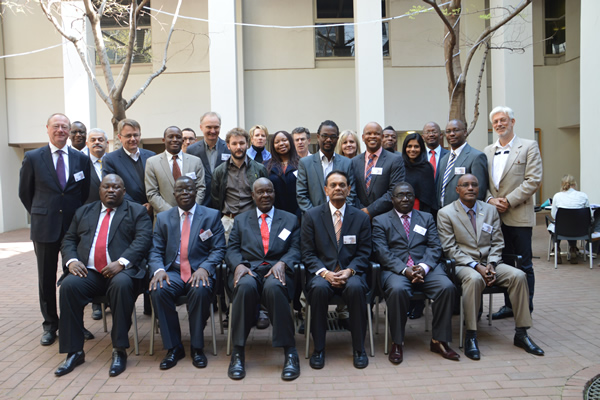The Centre for Human Rights, Faculty of Law, University of Pretoria, in collaboration with the Konrad Adenauer Stiftung, held a Round Table to discuss the restoration of the Southern African Development Community (SADC) Tribunal on 28 and 29 August 2014.
![]() Download the concluding statement
Download the concluding statement
![]() Download a detailed recap of the Round Table
Download a detailed recap of the Round Table
The Round Table was attended by different stakeholders including former judges of the SADC Tribunal; a former judge of the East African Court of Justice (EACJ); officials from the SADC Tribunal, EACJ and Economic Community of Western African States (ECOWAS) Court of Justice; lawyers from private and academic practice and officials from the Department of Justice, South Africa; the South African Law Society; researchers; and members of civil society.
The objective of the Round Table was to discuss the implications of the adoption of a new Protocol by the SADC Summit.
Some of the concerns raised include:
- The new Protocol will deprive the people of SADC access to the SADC Tribunal;
- The new SADC Tribunal gives access only to states;
- The abolition of individual access before the SADC Tribunal contradicts the global trend;
- The processes of the negotiation and adoption of the new Protocol were done in a non-transparent manner and excluded SADC citizens and civil society organisations, contrary to the letter and spirit of the SADC Treaty.
- The SADC Tribunal initially allowed access to its employees to settle their disputes with SADC as its employer, but by abolishing individual access, employees no longer have any legal recourse.
During the two-day Round Table, the participants discussed the different concerns as well as possible stratgies to restore the SADC Tribunal. This resulted in a drafting of a statement, thereby leading to the adoption of a common statement.
The following resolutions are included in the concluding statement:
- The Round Table urges the Heads of State and Government of SADC member states to reconsider their decision to suspend the SADC Tribunal and adopt the new Protocol.
- The Round Table urges SADC citizens to reject and protest against the decisions of the Summit adopted from August 2010 to August 2014 regarding the SADC Tribunal. This should be done through all lawful means, including petitioning national parliaments.
- The Round Table calls on the SADC Heads of State and Government and all institutions of SADC, in consultation with all stakeholders as provided for in the SADC Treaty, to immediately embark on the revision of the SADC Treaty to
- strengthen and democratise SADC institutions, including the SADC Secretariat;
- establish a regional parliament with law-making powers; and
- create a sub-regional court with adequate jurisdiction accessible to individuals.
- The Round Table calls on the relevant SADC organs/institutions to ensure that the process of establishing a mechanism for the resolution of cases that had been pending before the SADC Tribunal is transparent and participatory, so as to involve the ‘people’ and ‘key stakeholders’ in line with article 23 of the SADC Treaty.
- The Round Table resolves to collaborate and support the establishment of a Coalition for the Restoration of the SADC Tribunal, comprising stake holders in all SADC countries, to campaign against the ratification of the new Protocol and to explore and coordinate alternative strategies to restore individual access to the SADC Tribunal and to strengthen democracy and improve the rule of law within SADC.
- The Round Table calls for the restoration of individual access so that an authentic sub-regional court, the SADC Tribunal, capable of responding to the particularities of the region, would be able to dispense justice to the people of the region.


